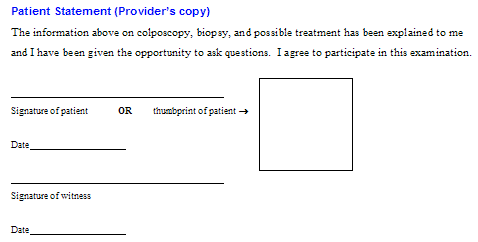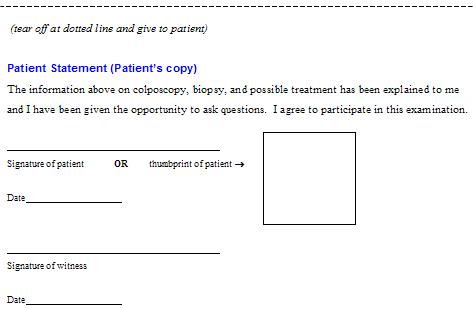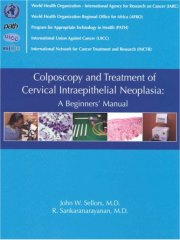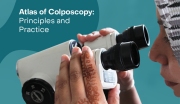Home / Training / Manuals / Colposcopy and treatment of cervical intraepithelial neoplasia: a beginnersí manual / Appendix / Appendix 2: Consent form
Consent Form
Patientís Name: ___________________
Health Center: ___________________
Consent for Colposcopy, Biopsy, and Possible Treatment
Cervical cancer is a problem for women in our region, but much of it could be prevented by simple tests. The clinicians here are using a test that can find problems early. If these problems are found early, they can be treated easily and cancer can be avoided.
Procedures
You were referred for colposcopy because there is a possible problem with your cervix. If you decide to participate in this examination, the clinician will provide counselling and education about cervical cancer, ask you some questions about your reproductive history and risk of being pregnant, and examine your cervix today. S/he will use a speculum to hold the vagina open. Then, s/he will gently wipe your cervix with vinegar. You may feel a slight stinging from the vinegar. The clinician will look at your cervix with a colposcope, which magnifies and illuminates the cervix to help the clinician see your cervix more clearly. The colposcope will not touch your body. The examination will take about 5 to 7 minutes.
If the examination with the colposcope shows that your cervix is healthy, you will be finished with your examination. If the examination with the colposcope shows that your cervix is not healthy, the clinician will take a small sample of tissue from your cervix (this is called a biopsy) in order to check the diagnosis.
The biopsy may cause some pain that lasts a few seconds and varies from mild pinching to some cramping sensations. After the biopsy, you will be treated with cryotherapy to remove the area that is a problem on your cervix. You will probably feel some cramping during and after the procedure; the cramping usually stops shortly after the procedure. You also will probably experience spotting or light bleeding from your cervix for 1 to 2 weeks and a watery vaginal discharge that lasts 2 to 4 weeks. You will be asked to not have sexual intercourse for 3 to 4 weeks to allow your cervix to heal properly. You also will be asked to return to the clinic 9-12 months after the procedure for a follow-up visit. The clinician will look at your cervix again with a colposcope in order to make sure that the treatment was successful. If, however, the colposcopic examination shows that the treatment was not successful, you will be advised on further steps to take.
Risks
You may be embarrassed by the vaginal examination. The colposcopy examination may cause vaginal irritation and burning for several minutes. You may experience slight vaginal bleeding for one or two days if a biopsy is taken from your cervix. You may experience a watery vaginal discharge for up to four weeks if you undergo treatment by cryotherapy. Although it is unlikely, you also may experience heavy vaginal bleeding. There is a 10% risk that cryotherapy, if used correctly, will not be effective, but this outcome will be detected at the follow-up examination after 9-12 months.
Eligibility
Before being examined, you will be asked a series of questions to determine if there is a chance of your being pregnant. If so, you will be tested with a standard urine pregnancy test. You will be examined using colposcopy regardless of your pregnancy status. If you require treatment and the pregnancy test is positive, your treatment will be postponed until six weeks after delivery.
Confidentiality
All of your personal information will be kept confidential and used only for your medical care. Any other use will require your written consent. If you refuse any part of this examination, it will not affect care that we give you in the future.
Questions
Please direct any questions you have about the examination or your rights as a patient to district hospital staff.


Colposcopy and treatment of cervical intraepithelial neoplasia: a beginnersí manual, Edited by J.W. Sellors and R. Sankaranarayanan
Appendix 2: Consent form
Filter by language: English / FranÁais / EspaŮol / Portugues / 中文Health Center: ___________________
Consent for Colposcopy, Biopsy, and Possible Treatment
Cervical cancer is a problem for women in our region, but much of it could be prevented by simple tests. The clinicians here are using a test that can find problems early. If these problems are found early, they can be treated easily and cancer can be avoided.
Procedures
You were referred for colposcopy because there is a possible problem with your cervix. If you decide to participate in this examination, the clinician will provide counselling and education about cervical cancer, ask you some questions about your reproductive history and risk of being pregnant, and examine your cervix today. S/he will use a speculum to hold the vagina open. Then, s/he will gently wipe your cervix with vinegar. You may feel a slight stinging from the vinegar. The clinician will look at your cervix with a colposcope, which magnifies and illuminates the cervix to help the clinician see your cervix more clearly. The colposcope will not touch your body. The examination will take about 5 to 7 minutes.
If the examination with the colposcope shows that your cervix is healthy, you will be finished with your examination. If the examination with the colposcope shows that your cervix is not healthy, the clinician will take a small sample of tissue from your cervix (this is called a biopsy) in order to check the diagnosis.
The biopsy may cause some pain that lasts a few seconds and varies from mild pinching to some cramping sensations. After the biopsy, you will be treated with cryotherapy to remove the area that is a problem on your cervix. You will probably feel some cramping during and after the procedure; the cramping usually stops shortly after the procedure. You also will probably experience spotting or light bleeding from your cervix for 1 to 2 weeks and a watery vaginal discharge that lasts 2 to 4 weeks. You will be asked to not have sexual intercourse for 3 to 4 weeks to allow your cervix to heal properly. You also will be asked to return to the clinic 9-12 months after the procedure for a follow-up visit. The clinician will look at your cervix again with a colposcope in order to make sure that the treatment was successful. If, however, the colposcopic examination shows that the treatment was not successful, you will be advised on further steps to take.
Risks
You may be embarrassed by the vaginal examination. The colposcopy examination may cause vaginal irritation and burning for several minutes. You may experience slight vaginal bleeding for one or two days if a biopsy is taken from your cervix. You may experience a watery vaginal discharge for up to four weeks if you undergo treatment by cryotherapy. Although it is unlikely, you also may experience heavy vaginal bleeding. There is a 10% risk that cryotherapy, if used correctly, will not be effective, but this outcome will be detected at the follow-up examination after 9-12 months.
Eligibility
Before being examined, you will be asked a series of questions to determine if there is a chance of your being pregnant. If so, you will be tested with a standard urine pregnancy test. You will be examined using colposcopy regardless of your pregnancy status. If you require treatment and the pregnancy test is positive, your treatment will be postponed until six weeks after delivery.
Confidentiality
All of your personal information will be kept confidential and used only for your medical care. Any other use will require your written consent. If you refuse any part of this examination, it will not affect care that we give you in the future.
Questions
Please direct any questions you have about the examination or your rights as a patient to district hospital staff.







